Tiếng Anh 9 Smart World Unit 2 Lesson 1
Tiếng Anh lớp 9 Unit 2 Life in the Past Lesson 1
Giải sách Tiếng Anh 9 i-Learn Smart World unit 2 Lesson 1 bao gồm đáp án các phần bài tập sgk tiếng Anh 9 Smart World Unit 2 trang 14 - 17 hỗ trợ các em học sinh chuẩn bị bài tập tại nhà trước khi đến trường.
In pairs: Look at the picture. What are the relationships between these people? What Vietnamese family traditions and customs do you know?
(Theo cặp: Quan sát tranh. Mối quan hệ giữa những người này là gì? Bạn biết những truyền thống, phong tục gia đình Việt Nam nào?)
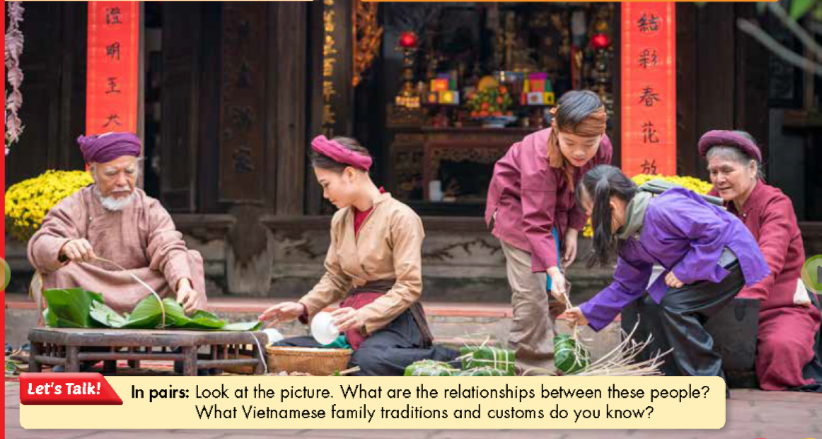
Gợi ý đáp án
Based on the description of the picture showing an extended family gathering to make "trưng cake" (bánh chưng or bánh tét) during Tet (Lunar New Year), we can infer several relationships and Vietnamese family traditions:
Family Relationships: In the picture, we would likely see multiple generations of family members, including grandparents, parents, siblings, cousins, and perhaps even distant relatives. The act of coming together to make trưng cake suggests a close-knit family bond and a shared tradition passed down through generations.
Collaborative Tradition: Making trưng cake during Tet is a significant tradition in Vietnamese culture. It involves a labor-intensive process where family members work together to prepare the ingredients, wrap them in banana leaves, and boil them for several hours. This tradition fosters teamwork and cooperation among family members.
Cultural Significance: Trưng cake is associated with Tet, the most important holiday in Vietnamese culture. It symbolizes prosperity, good fortune, and the coming of spring. By participating in the preparation of trưng cake, family members uphold cultural traditions and reinforce their cultural identity.
Respect for Elders: During the process of making trưng cake, younger family members often defer to elders and follow their instructions. This reflects the traditional Vietnamese value of respect for elders and the passing down of knowledge and wisdom from one generation to the next.
Shared Meals and Celebrations: After making trưng cake, the family may gather to share a meal and celebrate the Lunar New Year together. This communal gathering reinforces the importance of family unity and togetherness during festive occasions.
New Words
a. Match the underlined words with the definitions. Listen and repeat.
(Phù hợp các từ được gạch chân với các định nghĩa. Nghe và lặp lại.)
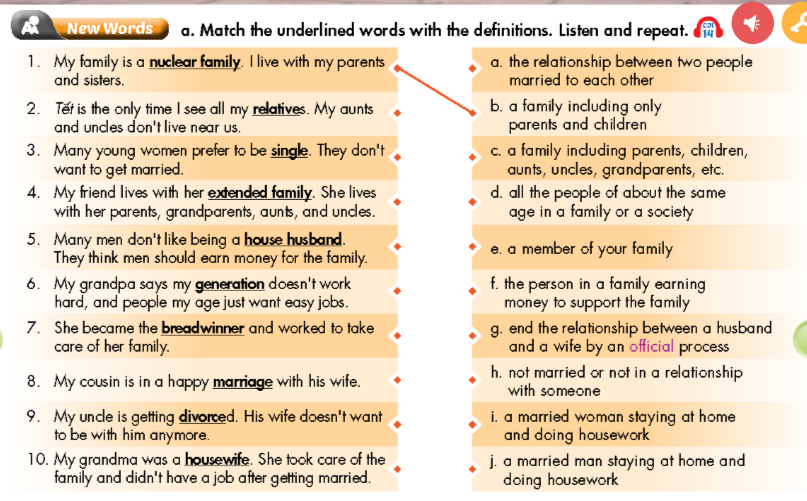
Gợi ý đáp án
|
1. b |
2. e |
3. h |
4. c |
5. j |
|
6. d |
7. f |
8. a |
9. g |
10. i |
Lời giải chi tiết
1 - a. a nuclear family: a family including parents, children, aunts, uncles, grandparents, etc.
(gia đình hạt nhân: một gia đình bao gồm cha mẹ, con cái, cô, chú, ông bà, v.v.)
2 - c. relatives: a member of your family
(họ hàng: một thành viên trong gia đình bạn)
3 - h. single: not married or not in a relationship with someone
(độc thân: chưa kết hôn hoặc không có mối quan hệ với ai đó)
4 - c. extended family: a family including parents, children, aunts, uncles, grandparents, etc.
(gia đình mở rộng: một gia đình bao gồm cha mẹ, con cái, cô, chú, ông bà, v.v.)
5 - j. house husband: a married man staying at home and doing housework
(chồng nội trợ: người đàn ông đã lập gia đình ở nhà và làm việc nhà)
6 - d. generation: all the people of about the same age in a family or a society
(thế hệ: tất cả những người cùng độ tuổi trong một gia đình hoặc xã hội)
7 - f. breadwinner: the person in a family earning money to support the family
(người trụ cột trong gia đình: người trong gia đình kiếm tiền để nuôi sống gia đình)
8 - a. marriage: the relationship between two people married to each other
(kết hôn: một quan hệ giữa hai người đã cưới nhau)
9 - g. divorced: end the relationship between a husband and a wife by an official process
(ly hôn: chấm dứt quan hệ vợ chồng bằng thủ tục chính thức)
10 - i. housewife: a married woman staying at home and doing housework
(bà nội trợ: người phụ nữ đã lập gia đình ở nhà và làm việc nhà)
b. In pairs: Use the new words to talk about your family or people you know.
(Theo cặp: Sử dụng các từ mới để nói về gia đình của bạn và những người bạn biết.)

Gợi ý đáp án
Gợi ý đáp án
A: Hey, do you have a big family?
(Xin chào, bạn có một gia đình lớn không?)
B: No, not really. We're a nuclear family, just me, my parents, and my brother.
(Không, không phải vậy. Chúng tôi là gia đình hạt nhân, chỉ có mẹ, bố và anh tôi.)
A: Oh, that's nice. Do you see your extended family often?
(À, thế à. Bạn có thường xuyên gặp gỡ gia đình mở rộng không?)
B: Not really. We only see them during holidays like Tết. My aunts and uncles live far away.
(Không hẳn. Chúng tôi chỉ gặp họ vào những dịp như Tết. Các cô chú của tôi sống xa đây.)
A: Got it. Do you know anyone who's divorced?
(Hiểu rồi. Bạn có biết ai ly dị không?)
B: Yes, my cousin recently got divorced. His wife didn't want to stay with him anymore.
(Có, anh của tôi gần đây đã ly dị. Vợ anh ấy không muốn ở sống với anh ấy nữa.)
A: I see. And what about your grandparents?
(Tôi hiểu rồi. Còn ông bà của bạn thì sao?)
B: Unfortunately, I don't have any grandparents left. They all passed away when I was young.
(Thật không may, tôi không còn ông bà nào nữa. Họ đã qua đời khi tôi còn nhỏ.)
A: I'm sorry to hear that. Who's the breadwinner in your family?
(Tôi rất tiếc khi nghe điều đó. Ai là người kiếm tiền trong gia đình bạn?)
B: My dad is the breadwinner. He works hard to support our family.
(Bố tôi là người kiếm tiền. Ông ấy làm việc chăm chỉ để nuôi dưỡng gia đình chúng tôi.)
A: That's great. How about your mom?
(Thật tuyệt vời. Còn mẹ của bạn thì sao?)
B: She used to be a housewife when we were younger, but now she's back to work too.
(Cô ấy từng là một người nội trợ khi chúng tôi còn nhỏ, nhưng bây giờ cô ấy cũng đã trở lại làm việc.)
A: Interesting. Thanks for sharing!
(Thú vị. Cảm ơn bạn đã chia sẻ!)
Reading
a. Read the interview with Mrs. Nguyễn about her memories of family life in the past. What does it mainly discuss?
(Đọc bài phỏng vấn với bà Nguyễn về những kỷ niệm của cuộc sống gia đình trong quá khứ. Đoạn văn thỏa luận chính về cái gì?)
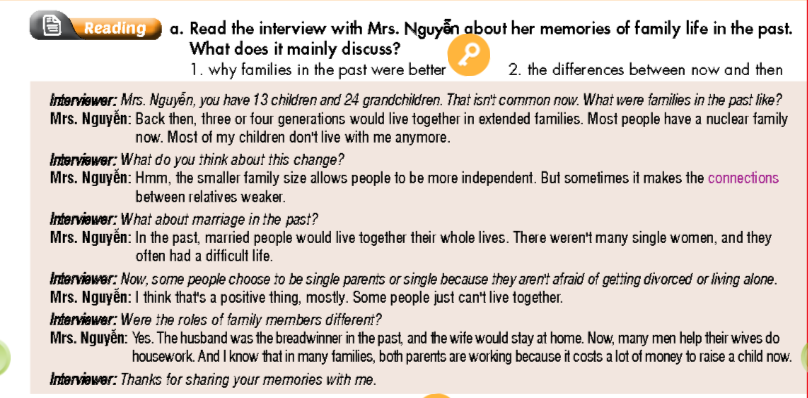
Gợi ý đáp án
2 - the differences between now and then
b. Now, read and circle True, False, or Doesn't say.
(Bây giờ, đọc và khoanh vào True, False, hoặc Doesn’t say)

Gợi ý đáp án
|
1. False |
2. True |
3. Doesn’t say |
|
4. False |
5. True |
c. Listen and read.
(Nghe và đọc)
d. In pairs: What changes mentioned in the interview can you see in your family?
What things do you agree or disagree with Mrs. Nguyễn about? Why?
(Thảo luận nhóm: Bạn có thể thấy những thay đổi nào được đề cập trong cuộc phỏng vấn trong gia đình mình? Bạn đồng ý hay không đồng ý với bà Nguyễn về điều gì? Tại sao?)
Gợi ý đáp án
Changes mentioned in the interview:
Smaller Family Size: Like Mrs. Nguyễn mentioned, my family has also experienced a decrease in family size compared to previous generations. Most of my relatives now have nuclear families instead of extended ones.
Roles of Family Members: Similar to the interview, the roles of family members in my family have evolved. While in the past, the husband was traditionally the breadwinner and the wife stayed at home, nowadays, both parents often work, and responsibilities are more evenly distributed.
Agreement/Disagreement with Mrs. Nguyễn:
Positive Aspects of Smaller Families: I agree with Mrs. Nguyễn that smaller family sizes can foster independence. However, I also see her point about weaker connections between relatives, which can sometimes be a downside.
Attitudes Towards Being Single: While Mrs. Nguyễn sees the choice to be single or a single parent as positive, I agree with her partially. It's positive that individuals have more freedom to choose their lifestyles, but it's essential to acknowledge the challenges that come with being single, especially for single parents.
Changing Gender Roles: I agree with Mrs. Nguyễn's observation about changing gender roles in families. Men helping with housework and both parents working are positive developments that contribute to more equitable relationships within families.
Grammar
a. Read about would and then fill in the bank.
(Đọc về would và sau đó điền vào chỗ trống.)
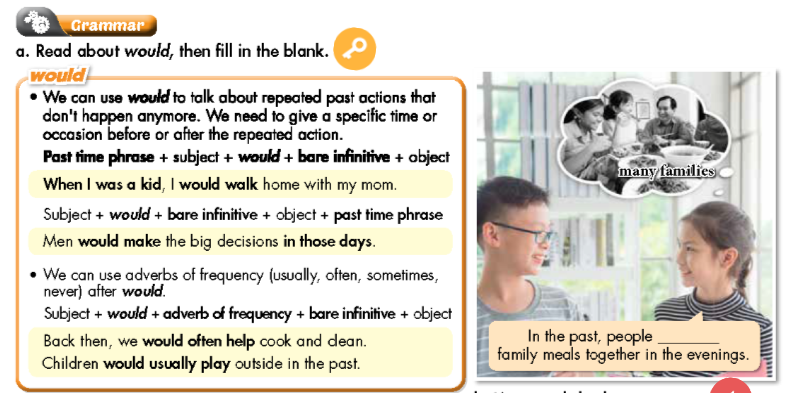
Gợi ý đáp án
In the past, people would eat family meals together in the evenings.
b. Listen and check. Listen again and repeat.
(Nghe và kiểm tra. Nghe lại và nhắc lại)
c. Unscramble the sentences.
( Sắp xếp lại câu.)
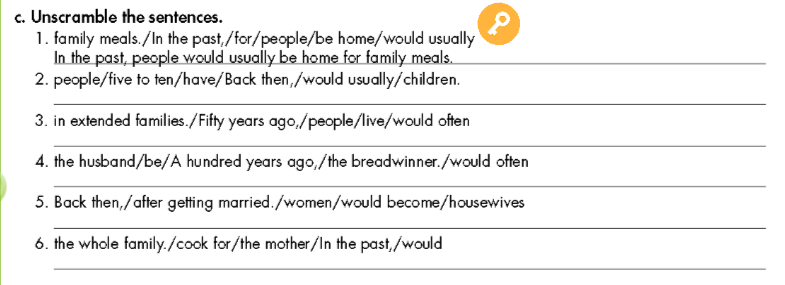
Gợi ý đáp án
1. In the past, people would usually be home for family meals.
2. Back then, people would usually have five to ten children.
3. Fifty years ago, people would often live in extended families.
4. A hundred years ago, the husband would often be the breadwinner.
5. Back then, women would often become housewives after getting married.
6. In the past, the mother would often cook for the whole family.
d. Read the statements about life in the past and complete the sentences below using would or the Past Simple.
( Đọc những câu nói về cuộc sống trong quá khứ và hoàn thành các câu dưới đây bằng cách sử dụng will hoặc Quá khứ đơn.)
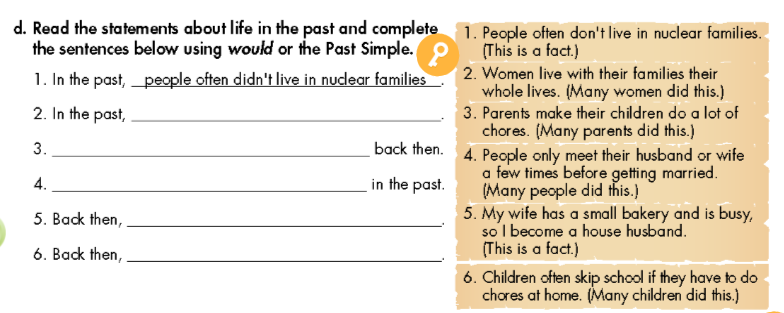
Gợi ý đáp án
1. In the past, people often didn't live in nuclear families.
2. In the past, women would live with their families their whole lives.
3. Parents would make their children do a lot of chores back then.
4. People would only meet their husband or wife a few times before getting married in the past.
5. Back then, my wife had a small bakery and was busy, so I became a house husband.
6. Back then, children would often skip school if they had to do chores at home.
e. In pairs: Use the topics below to talk about things that happened regularly when you were a kid.
(Theo cặp: Sử dụng các chủ đề dưới đây để nói về những điều đã xảy ra thường xuyên khi bạn còn nhỏ.)

Gợi ý đáp án
Going to School:
Every morning, I used to wake up early to catch the school bus and meet friends at the bus stop.
During the day, I followed a fixed schedule of classes and participated in extracurricular activities after school.
At School:
At school, I listened to teachers giving lessons, completed homework assignments, and interacted with classmates during group activities.
After School:
After returning home from school, I would have a snack before starting homework or attending extracurricular lessons.
On the Weekends:
On the weekends, I often slept in late, had breakfast with family, and went out for family outings or met up with friends for playdates.
On Holidays:
During holidays, my family and I traveled to visit relatives, explore new places, and participate in cultural or religious celebrations.
In the Summer:
During the summer, I enjoyed outdoor activities like playing sports, going swimming, and attending summer camps or workshops to learn new skills.
Pronunciation
a. Focus on the /i/ and /i:/ sounds
(Tập trung vào âm thanh /i/ và /iː)
b. Listen. Notice the sounds of the underlined letters.
(Nghe. Chú ý âm thanh của các chữ cái được gạch chân.)
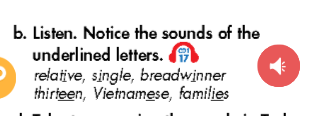
c. Listen and circle the words you hear.
(Nghe và khoanh tròn vào từ bạn nghe được)
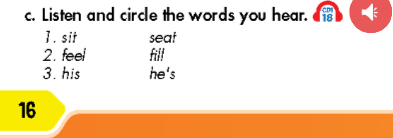
Gợi ý đáp án
1 - sit
2 - feel
3 - his
d. Take turns saying the words in Task c. while your partner points to them.
(Lần lượt nói các từ trong phần c. trong khi bạn của bạn chỉ vào chúng)
Practice
a. In pairs: Take turns talking about memories of family life in the past and compare them with family life now.
(Theo cặp: Lần lượt nói về những kỷ niệm trong cuộc sống gia đình ngày xưa và so sánh với cuộc sống gia đình hiện tại.)
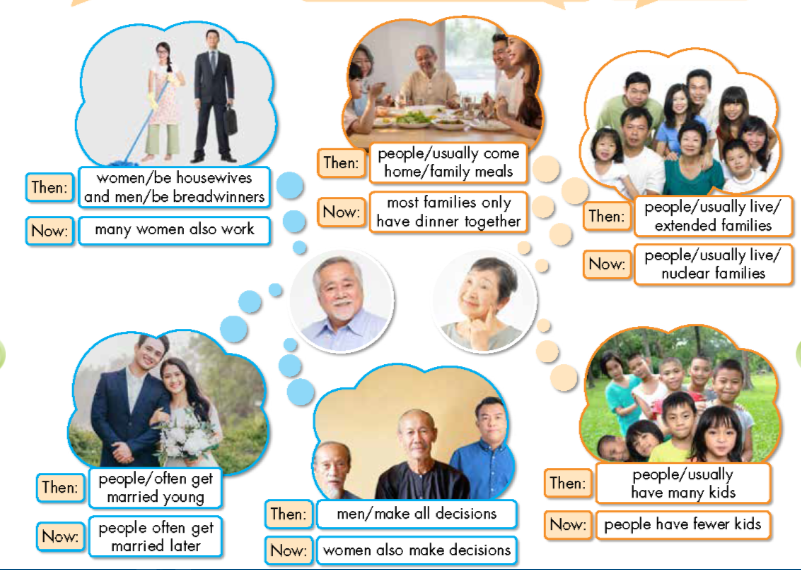
Gợi ý đáp án
1 - What do you remember about family life in the past, Grandpa?
Back then, women would be housewives, and husbands would be breadwinners. Many women also work now.
2 - What do you remember about family life in the past, Grandpa?
Back then, people usually came home for family meals. Now, most families only have dinner together.
3 - What do you remember about family life in the past, Grandpa?
In the past, people usually lived in extended families. Now, people usually live in nuclear families.
4 - What do you remember about family life in the past, Grandpa?
Back then, people often got married young. Now, people often get married later.
5 - What do you remember about family life in the past, Grandpa?
In the past, men made all decisions in their families. Now, women also make decisions in their families
6 - What do you remember about family life in the past, Grandpa?
Back then, people usually have many kids. Now, people have fewer kids
b. Practice with your own ideas.
(Luyện tập với ý tưởng của riêng bạn.)
Gợi ý đáp án
1. People used to write letters and talk face-to-face more often in the past, instead of using cell phones and computers like today.
2. In the past, families often lived closer together, maybe in the same neighborhood, and people used to help each other more.
3. In the past, getting around mainly involved walking or using slow transportation like horses or horse-drawn carriages.
4. Education used to happen in traditional classrooms, where students sat in rows and learned from textbooks, without much technology like today.
5. Entertainment in the past was often simple activities like reading books, playing board games, and participating in community events.
6. In the past, women usually did housework and took care of children, while men often went to work to earn money.
7. In the olden days, there were more strict rules and regulations in society, and people tended to follow them.
Speaking
a. In pairs: Discuss how people remember family traditions and customs in the past and compare them to today. Discuss the points below.
(Thảo luận theo cặp: Thảo luận về cách mà mọi người nhớ về truyền thống và phong tục gia đình trong quá khứ và so sánh chúng với hiện tại. Thảo luận về các điểm sau.)
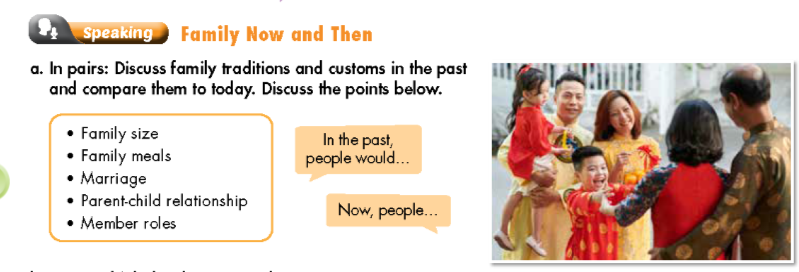
Gợi ý đáp án
A: Hi, let's talk about how people remember family traditions and customs in the past compared to today.
B: Sure, sounds interesting. So, in the past, people often had different dynamics in their parent-child relationships. Parents were usually more authoritative and children had to obey them without question.
A: Yeah, that's true. But nowadays, there seems to be more emphasis on open communication and mutual respect between parents and children. Parents often encourage their kids to express themselves and make decisions together as a family.
B: Right. Another thing that's changed is family size. Back then, families tended to be larger, with several children and sometimes even extended family members living together under one roof.
A: Definitely. But now, families are generally smaller, with fewer children. This change might be due to various factors like economic considerations, lifestyle choices, and access to birth control.
B: And what about family meals? I remember my grandparents telling me how everyone used to gather around the table for dinner every night, but nowadays, with busy schedules and different dietary preferences, it's not always easy to have regular family meals together.
A: Yeah, that's a noticeable change. But some families still make it a priority to have at least one meal together every day, even if it's just breakfast or dinner.
B: How about marriage? In the past, people often got married at a younger age, and arranged marriages were more common. But now, there's more emphasis on personal choice and finding a partner based on compatibility and shared values.
A: That's right. And regarding member roles within the family, traditional gender roles used to be more rigidly defined. Men were typically the breadwinners while women took care of the household and children. But now, there's more flexibility and equality in how responsibilities are shared within families.
B: Exactly. It's interesting to see how family dynamics and traditions have evolved over time, reflecting changes in society and cultural values.
A: Definitely. It's important to remember and appreciate our family traditions from the past while also embracing the changes and opportunities of the present.
B: Absolutely. Our family traditions and customs are an important part of our identity and heritage, and it's up to us to pass them on to future generations.
b. Do you think the changes are better or worse? Why?
(Bạn nghĩ những thay đổi liệu tốt hay tệ hơn? Tại sao?)

Gợi ý đáp án
I think the change in family size is better. Living with many people can be uncomfortable.
I think the change in parent-child relationship is better. In the past, there was often a strict hierarchy where children were expected to unquestioningly obey their parents. Nowadays, there's more emphasis on mutual respect and open communication, allowing for healthier and more supportive relationships within the family.
I think the change in member roles is better. In the past, gender roles were often rigidly defined, with specific expectations for each family member based on their gender. However, today, there is more flexibility and equality in how responsibilities are distributed within the family. This allows individuals to pursue their interests and strengths regardless of gender, leading to more fulfilling and harmonious family dynamics.
I think the change in family meals is worse. In the past, having regular family meals together was a common practice that helped strengthen bonds and foster communication within the family. However, nowadays, with busy schedules and various commitments, it's becoming increasingly challenging for families to sit down together for meals. This can lead to a loss of quality family time and may have negative effects on family relationships and cohesion.
Trên đây là trọn bộ Tiếng Anh 9 Smart World Unit 2 Lesson 1.
>> Bài tiếp theo: Tiếng Anh 9 Smart World Unit 2 Lesson 2








